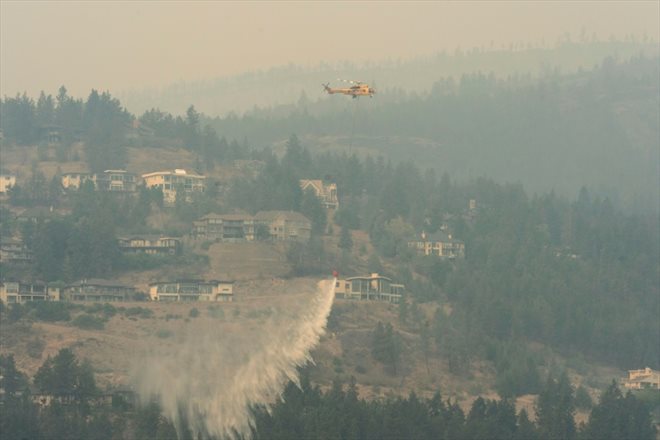The McDougall Creek fire in West Kelowna, British Columbia, on August 17, 2023 in Canada (AFP/Archives/Darren HULL)
His wine estate served as his roof for days when the fire was at the gates of his city. But today Joanna Schlosser, a resident of Western Canada, is mainly worried about the long-term damage to her farm and to the economy in general.
The country is experiencing the most intense fire season in its history this year: nearly 16 million hectares have burned and 200,000 people have been displaced, particularly in the West and the Far North.
Many regions are at a standstill, sectors affected: little by little, the bill and the economic impact are growing for this G7 country.
“We are facing a fairly devastating season in terms of visits and sales in the vineyards”, explains to AFP Joanna Schlosser, who had to flee her house in a few minutes in the middle of the night.
More than 200 homes were destroyed by the flames in this wealthy and very touristy region of British Columbia.

A deserted highway in West Kelowna, during the forest fires, on August 21, 2023 in British Columbia, Canada (AFP/Archives/Darren HULL)
This year, the tourist windfall has been greatly reduced, with travelers fleeing the fires and smoke that have suffocated the region for weeks.
With Kelowna City’s airport and main highway temporarily closed, tastings, weddings and other events have been cancelled.
– “Bad numbers” –
In a note, Stephen Brown, an analyst for Capital Economics, explains that in principle, wildfires have little measurable impact on the Canadian economy.

Kelowna airport closed during wildfires, August 20, 2023 in British Columbia, Canada (AFP/Paige Taylor White)
But this year, “they are so widespread that we are seeing a greater impact than usual”.
They seem “to be responsible for much of the recent weakness in GDP” and with the fire season not over “the numbers are likely to remain poor in the months to come”, he added. .
Canada saw its economy contract by 0.2% in the second quarter and the start of the third quarter follows the same trend.
Among the factors contributing to the drop were “wildfires that halted oil and gas production in May and limited consumer activity in June,” according to James Orlando of TD Bank. Another sector affected: the timber industry, which employs more than 30,000 people in the country.
In a June report, Oxford Economics warned that wildfires could reduce Canada’s economic growth this year by 0.3 to 0.6 percentage points.

The McDougall Creek fire in West Kelowna, British Columbia, on August 17, 2023 in Canada (AFP/Archives/Darren HULL)
However, the track record is “not as bad as it could have been,” said Tony Stillo of Oxford Economics.
“Even though wildfires are historically significant, they occur in more remote areas, with less impact on large populations, economic centers or transportation corridors – which could cut supply lines,” he explained.
– Multiplication of disasters –
In its new climate adaptation plan, Ottawa estimates the annual cost of fighting forest fires at 1 billion Canadian dollars (682 million euros).

A helicopter drops its cargo of water on the McDougall Creek fire on August 19, 2023 in West Kelowna, British Columbia, Canada (AFP/Paige Taylor White)
And especially underlines that, according to the Canadian Institute of the climate, climate change, which aggravates the episodes of drought and therefore makes more likely and frequent the forest fires, could reduce by half the expected economic growth of Canada over the next few years. .
By 2030, average annual disaster losses are expected to reach C$15.4 billion.
Insurance losses have already increased fivefold since 2009 to more than C$2 billion a year, according to the Insurance Bureau of Canada, which represents various private insurance companies.
Jason Clark, who works for the organization, says he is concerned that Canadians no longer face a disaster every decade but rather “several events in a single year” – fires, floods, waves of heat, storms…
“When countries regularly experience large losses, it has a significant impact on risk assessments and insurance premiums,” he adds.
“We need to be better prepared.”
© 2023 AFP
Did you like this article ? Share it with your friends with the buttons below.




